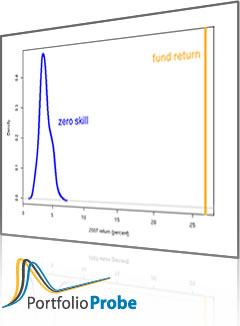Follow us using:
Newsletter Sign-up
Monthly Archives: April 2013
Slouching towards simulating investment skill
When investment skill is simulated, it is often presented as if it is obvious how to do it. Maybe I’m wrong, but I don’t think it’s obvious. Previously In “Simple tests of predicted returns” we saw that prediction quality need not look like what you would find in a textbook. For example, there was a … Continue reading
US market portrait 2013 week 17
US large cap market returns. Fine print The data are from Yahoo Almost all of the S&P 500 stocks are used (as implied by Wikipedia on 2013 January 5 — see the R commands to scrape the data) The initial post was “Replacing market indices” The R code is in marketportrait_funs.R — you are free … Continue reading
garch and the distribution of returns
Using garch to learn a little about the distribution of returns. Previously There are posts on garch — in particular: A practical introduction to garch modeling The components garch model in the rugarch package garch and long tails There has also been discussion of the distribution of returns, including a satire called “The distribution of … Continue reading
US market portrait 2013 week 16
US large cap market returns. Fine print The data are from Yahoo Almost all of the S&P 500 stocks are used (as implied by Wikipedia on 2013 January 5 — see the R commands to scrape the data) The initial post was “Replacing market indices” The R code is in marketportrait_funs.R — you are free … Continue reading
Stock-picking opportunity and the ratio of variabilities
How good is the current opportunity to pick stocks relative to the past? Idea The more stocks act differently from each other relative to how volatile they are, the more opportunity there is to benefit by selecting stocks. This post looks at a particular way of investigating that idea. Data Daily (log) returns of 442 … Continue reading
Posted in Quant finance, R language
Tagged opportunity ratio, S&P 500, stock-picking opportunity, volatility
6 Comments
US market portrait 2013 week 15
US large cap market returns. Fine print The data are from Yahoo Almost all of the S&P 500 stocks are used (as implied by Wikipedia on 2013 January 5 — see the R commands to scrape the data) The initial post was “Replacing market indices” The R code is in marketportrait_funs.R — you are free … Continue reading
Expected returns of an investment mandate
What to expect from fund managers who follow your investment mandate. You hope that the fund managers that you hire have skill. But markets are noisy so it is hard to tell skill from luck. It is impossible to tell skill from luck if you don’t know what luck looks like. Here we draw pictures … Continue reading
US market portrait 2013 week 14
US large cap market returns. Fine print The data are from Yahoo Almost all of the S&P 500 stocks are used (as implied by Wikipedia on 2013 January 5 — see the R commands to scrape the data) The initial post was “Replacing market indices” The R code is in marketportrait_funs.R — you are free … Continue reading
Alternative equity indices and random portfolios
A study has come out of Cass Business School that investigates a number of ways of building equity indices. Andrew Clare, Nicholas Motson and Stephen Thomas, of course, include market capitalization weighting. A number of schemes that fall under the name of “smart beta” are also included. They compare the indices not only among themselves … Continue reading
A pictorial history of US large cap correlation
How has the distribution of correlations changed over the last several years? Previously Posts about correlation boxplots explained Data Daily returns of 443 large cap US stocks from 2004 through 2012 were used. The sample correlations — almost 98,000 of them — during each year were created. If we were actually using the correlations, then … Continue reading
